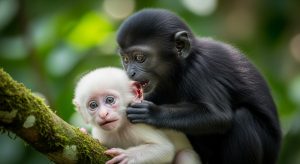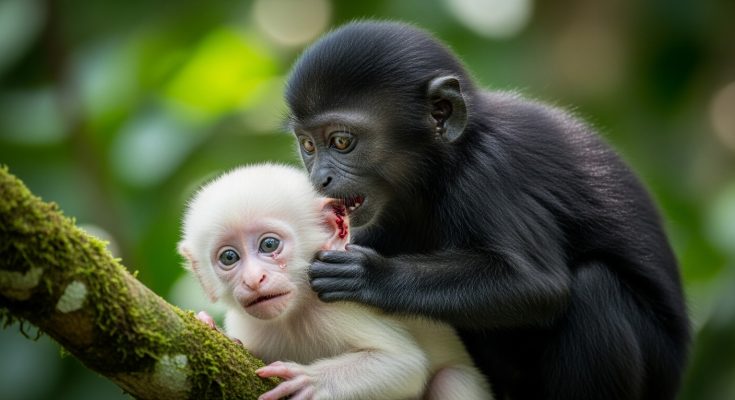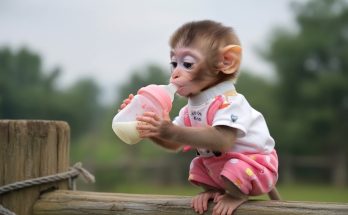
The Peaceful Morning
Deep within the lush tropical rainforest of Southeast Asia, where ancient trees stretched toward the sky and thick vines created a dense canopy overhead, two separate monkey troops had coexisted for generations. The morning sun filtered through the emerald leaves, casting dappled shadows across the forest floor where both black-furred and white-furred monkeys had established their territories along the winding river that divided their domains.
The black monkey troop, consisting of twenty members with jet-black fur that glistened in the sunlight, occupied the eastern bank of the river. Their fur was so dark it appeared almost midnight blue in certain lighting, and their intelligent amber eyes constantly scanned the forest for both food and potential threats. Among this troop was a particularly energetic baby monkey named Kito, only six months old, whose small body was covered in the same glossy black fur as his family members. Kito’s mother, Amara, was a protective and experienced female who rarely let her infant out of her sight.
On the western bank, separated by the shallow but swift-moving river, lived the white monkey troop. These remarkable primates possessed unusual silvery-white fur that made them stand out dramatically against the green jungle backdrop. Their troop numbered fifteen individuals, led by a large dominant male named Shiro, whose pure white coat and powerful build commanded respect from all members of his group. The white monkeys were known for their calm demeanor and their preference for the fruit-bearing trees that grew abundantly on their side of the river.
For years, an unspoken agreement had existed between the two troops. The river served as a natural boundary, and neither group ventured into the other’s territory. This peaceful coexistence had allowed both troops to thrive, raising their young and foraging without conflict. The older monkeys remembered a time when territorial disputes had led to violent confrontations, and they preferred the current arrangement that kept both groups safe and well-fed.
The Boundary Crossing
On this particular morning, young Kito was feeling adventurous. His mother had been distracted by the arrival of ripe mangoes in a nearby tree, and the baby monkey saw his opportunity for exploration. His curious nature and boundless energy drove him to investigate everything around him, and today, the mysterious white monkeys across the river captured his attention completely.
Kito had watched the white-furred troop from afar many times, fascinated by their unusual coloring and different social behaviors. Unlike his own troop, which was vocal and active, the white monkeys seemed quieter and more methodical in their movements. The baby monkey’s innocent curiosity overcame any sense of danger or understanding of territorial boundaries that older monkeys instinctively possessed.
The river, which usually served as an effective barrier, was running lower than usual due to the dry season. Exposed rocks created a path of stepping stones that Kito believed he could navigate. Without considering the consequences or alerting his mother, the small black baby monkey began his crossing. His tiny hands and feet gripped the wet stones as he hopped from one to another, his long tail helping him maintain balance as the water rushed beneath him.
Several members of the white monkey troop noticed the small black figure making its way across the river. Adult white monkeys began to gather at the water’s edge, their alarm calls echoing through the trees. Shiro, the dominant white male, moved to the front of his group, his muscular body tense and ready. His experienced eyes recognized the potential threat that even a baby from the rival troop represented – not from the infant itself, but from the protective adults who would surely follow if they noticed their missing youngster.
The Encounter
Kito successfully completed his river crossing and pulled himself onto the western bank, his black fur dripping with water. He shook himself vigorously, sending water droplets flying in all directions, completely unaware of the dozens of eyes watching his every move. To the baby monkey, this was simply an exciting adventure into a new and fascinating world. He reached out to touch a white flower that grew near the bank, his small fingers exploring its soft petals with innocent wonder.
The white monkey troop maintained their distance, forming a semicircle around the intruder but not approaching too closely. Their calls varied from warning barks to concerned chatters, creating a symphony of alarm that echoed through the forest. Young white monkeys hid behind their mothers, peering out with a mixture of fear and curiosity at the small black visitor who had broken generations of boundary respect.
One particular white monkey, a juvenile male named Yuki who was only slightly older than Kito, felt particularly threatened by this intrusion. Yuki was at that difficult age where he was trying to establish his place in the troop’s hierarchy, eager to prove himself to the adults and especially to Shiro. The arrival of this black baby monkey presented what Yuki saw as an opportunity to demonstrate his territorial defense capabilities and earn recognition from the dominant male.
Against the warning signals of his mother, Yuki broke away from the group and approached Kito directly. The young white monkey moved with exaggerated confidence, his chest puffed out and his lips pulled back to display his small but sharp teeth. He vocalized aggressively, making threatening gestures with his arms and jumping up and down to appear larger and more intimidating to the black baby monkey.
Kito, who had been peacefully examining a interesting beetle on a nearby leaf, looked up in surprise at the approaching white monkey. His amber eyes widened with a mixture of fear and confusion. This was not the friendly exploration he had imagined. The baby black monkey took several steps backward, his small body beginning to tremble as Yuki continued his aggressive approach.
The Confrontation
Yuki’s confidence grew as he saw the black baby monkey retreating. Emboldened by what he perceived as weakness, the young white monkey increased his aggressive display. He grabbed a stick from the ground and waved it menacingly, screeching loudly to assert his dominance over this territorial violator. The other white monkeys watched with varying reactions – some adults appeared concerned about Yuki’s escalating behavior, while others seemed to approve of the young male’s defensive actions.
Kito continued backing away until his small body pressed against the trunk of a large tree, leaving him with nowhere else to retreat. His innocent adventure had transformed into a terrifying situation that his young mind struggled to process. The baby monkey’s instincts told him to flee, but Yuki had effectively blocked his path back to the river and safety.
In his panic, Kito did what any frightened infant primate would do – he cried out loudly for his mother. His distress calls were high-pitched and desperate, carrying across the river to where his troop foraged on the opposite bank. The sound immediately captured Amara’s attention, and the mother monkey’s head snapped up in alarm, her eyes frantically searching for her missing baby.
Yuki, interpreting Kito’s cries as signs of submission, moved even closer. The young white monkey reached out with one hand, intending to push the black baby away from his territory with what he believed was a justified show of force. However, what Yuki failed to understand in his youth and inexperience was that a cornered animal, no matter how small or young, can become dangerous when left with no other options.
The Bite
As Yuki’s hand made contact with Kito’s shoulder, pushing him roughly against the tree trunk, the black baby monkey’s fear transformed into defensive aggression. Acting purely on survival instinct, Kito opened his small mouth wide and lunged forward, his sharp baby teeth sinking deeply into Yuki’s extended forearm. The bite was not calculated or malicious – it was the desperate act of a terrified infant protecting himself from what he perceived as a life-threatening attack.
The sensation was immediate and shocking for Yuki. The young white monkey had never experienced real pain in a confrontation before, as his previous disputes with troop members had always been broken up by adults before any serious harm occurred. Kito’s teeth, though small, were surprisingly sharp and had penetrated through the white fur and into the flesh beneath. The black baby monkey’s jaw clamped down with remarkable force, driven by pure panic and the primal need to defend himself.
Yuki screamed in pain and surprise, his aggressive posture immediately dissolving as he tried desperately to pull his arm free from Kito’s bite. The young white monkey shook his arm violently, which only caused Kito to bite down harder, his survival instincts overriding any thought of releasing his grip. Blood began to seep through Yuki’s white fur, staining it red around the bite wound, making the injury visible to all the watching monkeys.
The entire white monkey troop erupted into chaos at the sight of one of their young being injured. Adult white monkeys rushed forward, their protective instincts triggered by Yuki’s screams and the visible blood. Shiro, the dominant male, bounded toward the conflict with incredible speed, his powerful body moving with both grace and threatening purpose. The peaceful morning had exploded into a full-scale territorial crisis in mere seconds.
The Rescue
From across the river, Amara had already launched herself toward the water the moment she heard her baby’s distress calls. The mother black monkey moved with a speed and determination that only a parent protecting their offspring could achieve. She crossed the river in seconds, leaping from stone to stone with practiced ease, her powerful legs propelling her toward the western bank where her baby was in danger.
Other adult black monkeys followed Amara’s lead, recognizing the seriousness of the situation. The carefully maintained boundary between the two troops was dissolving rapidly as the black monkey troop mobilized to rescue their captured youngster. Warning calls echoed from both sides of the river as the potential for full-scale conflict between the two troops became increasingly likely.
Amara reached the western bank just as Shiro arrived at the scene of the bite. The dominant white male’s presence finally caused Kito to release his grip on Yuki’s arm. The baby black monkey, seeing his mother, let go and tried to run toward her, but found himself surrounded by angry white monkeys on all sides. Yuki clutched his bleeding arm, his earlier confidence completely shattered as he whimpered in pain and sought comfort from nearby adults.
The tension in the air was palpable as Amara faced off against Shiro, with Kito trapped between them. Both troops had now gathered on the western bank, with dozens of black and white monkeys facing each other in what could easily escalate into violent conflict. The dominant males from both groups positioned themselves at the front, their bodies language clear – they would protect their troops at any cost.
Shiro’s attention shifted between the injured Yuki and the terrified Kito. As an experienced leader, the white monkey could recognize the situation for what it was – not a deliberate attack, but a frightened baby’s defensive response to perceived danger. However, Yuki’s injury was real, and the young white monkey’s blood staining the ground demanded some form of response from the troop leader.
Amara vocalized loudly, her calls mixing apology with firm assertion of her right to retrieve her baby. Her body language communicated no aggression toward the white troop, only a desperate mother’s need to reclaim her infant and return to safety. She took slow, deliberate steps forward, her eyes never leaving Shiro’s face, seeking permission to approach Kito.
The Resolution
For several long, tense moments, the entire forest seemed to hold its breath. Both monkey troops waited to see how their leaders would resolve this unprecedented situation. The rules that had governed their peaceful coexistence for years had been broken, blood had been spilled, and the response to these events would determine whether peace could be restored or if warfare would erupt between the two groups.
Shiro, displaying the wisdom that had made him an effective leader, made a decision. He stepped aside, creating a clear path between Amara and her baby. His action communicated to both troops that he recognized this incident for what it was – an accident born of youthful recklessness and fear, not a calculated act of aggression. The dominant white male’s gesture effectively de-escalated the situation, preventing what could have become a bloody conflict.
Amara seized the opportunity immediately, rushing forward to scoop up Kito in her arms. The baby black monkey clung to his mother desperately, his small body shaking with residual fear. The mother monkey quickly retreated toward the river, with the other members of her troop forming a protective escort around her. No white monkeys pursued them, following Shiro’s lead in allowing the peaceful withdrawal.
As the black monkey troop crossed back to their territory, carrying the traumatized Kito to safety, the white monkeys gathered around the injured Yuki. Several adult females began grooming the young male’s wounded arm, their gentle attention helping to clean the bite marks and provide comfort. The injury, while painful and bleeding, was not life-threatening. Yuki would recover fully, though he carried physical scars as a reminder of his confrontation with the small black baby monkey.
The Aftermath
In the days and weeks that followed the incident, both monkey troops maintained an even more careful respect for the territorial boundary. Kito, thoroughly traumatized by his adventure gone wrong, stayed close to his mother’s side and showed no further interest in crossing the river. The baby black monkey had learned a harsh lesson about boundaries and the dangers of venturing into unknown territories.
Yuki’s arm healed slowly, the white fur eventually growing back over the scar tissue where Kito’s teeth had broken his skin. The young white monkey’s attitude changed considerably after the incident. His earlier cockiness had been replaced with a more cautious and thoughtful approach to potential conflicts. The experience taught him that aggression could have painful consequences and that sometimes discretion was the better part of valor.
The elder monkeys from both troops took the incident as an opportunity to reinforce social learning among their younger members. Baby and juvenile monkeys were closely supervised near the river boundary, with adults intervening quickly if any youngster showed signs of attempting to cross. The story of Kito and Yuki became a cautionary tale passed down through both troops, a reminder of why the boundaries existed and why they needed to be respected.
Interestingly, as both Kito and Yuki grew older, they occasionally spotted each other across the river during foraging times. Rather than displaying aggression or fear, the two monkeys would sometimes sit and observe one another from their respective banks, as if sharing an unspoken understanding of their shared experience. They had both learned difficult lessons on that chaotic morning – Kito about the dangers of crossing boundaries without permission or protection, and Yuki about the consequences of bullying those weaker than himself.
The scar on Yuki’s arm remained visible beneath his white fur for the rest of his life, a permanent reminder of the day a tiny black baby monkey’s desperate bite changed both their lives forever. The incident reinforced the importance of territorial respect, the dangers of youthful overconfidence, and the powerful protective instincts that drive all primates when their young are threatened. In the complex social world of monkey troops, this single moment of conflict had taught valuable lessons to an entire generation, helping to maintain the delicate peace that allowed both the black-furred and white-furred monkeys to thrive in their shared forest home.



